WEEK 4: June 28th 2021
Breathe…Out: Letting go and letting be
“I am.”
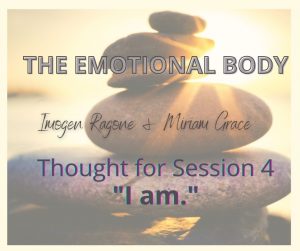 “Fear is excitement without the breath.”
“Fear is excitement without the breath.”
– Fritz Perls, Founder of Gestalt Therapy
“Change occurs when one becomes what he is, not when he tries to become what he is not.”
– Arnold Beisser
“Do, or do not. There is no try.”
– Yoda
“We do not learn from experience. We learn from reflecting on experience.”
– John Dewey
It’s been a pleasure to work with you all. As well as the possibility of coming together again as a group later in the year, both Imogen and Miriam offer their own programs and resources through their individual websites and Facebook presence. Please stay in touch!
Miriam:
Email: miriam@blue-skies.org.uk
Website: blue-skies.org.uk
Facebook Page: Miriam Blue Skies
Facebook Group: Skies are Blue: A Thousand Beautiful Things
Imogen:
Email: imogen@imogenragone.com
Website: imogenragone.com
Facebook Page: BodyIntelligence with Imogen Ragone
Facebook Group: BodyIntelligence Community – please join!
Assignments
- Reflect on your Emotional Body Workshop experience and fill out this short evaluation: GO TO FORM
- Continue to practice TheCyCle every day!
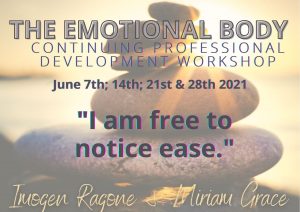
Resources
Videos:
Imogen and Miriam: Self Awareness, Self Responsibility, Self Care, and Self Acceptance
Dr Gail Parker (Psychologist and Yoga Teacher) 2:59 – Race Based Trauma and Yoga as an Intervention
Dr Gail Parker (Psychologist and Yoga Teacher): Race based trauma is an injury not a disorder 1:14:00
6 minute Meditation “I am I” by Will Parfitt (Psychosynthesis teacher) spoken by Miriam Grace
The Paradoxical Theory of Change – a video of 2 mins
Blogs:
Miriam:
Imogen:
Podcasts:
Two podcasts with Brene Brown on the subject of racism:
- Brené Brown talks with Ibram X. Kendi on How to Be an Antiracist
- Brené Brown talks with Chad Sanders on What Black Leaders Learned from Trauma and Triumph
Chronic Pain:
- Neuroplasticity and Persistent Pain with Dr. Adriaan Louw 28 minute podcast
Alexander Technique and Breathing:
Alexander Technique teacher Robert Rickover in conversation with Jessica Wolf, an Alexander Technique teacher in New York City, and a long-time student of Carl Stough, an expert in respiratory science. Jessica has developed a body of work called The Art of Breathing and here she talks with Robert about breathing and the Alexander Technique Technique.
https://bodylearning.buzzsprout.com/382/15337-the-alexander-technique-and-the-art-of-breathing
The Alexander Technique and two Art of Breathing Procedures
Jessica Wolf here guides two introductory breathing procedures she uses in her work, The Art of Breathing:
https://bodylearning.buzzsprout.com/382/15336-the-alexander-technique-and-two-art-of-breathing-procedures
Articles
The Body Keeps The Score – article
See also our booklist for PAIN IS REALLY STRANGE! – this book explains in simple language how we can begin to find ways of finding more ease, and mapping new, positive experiences on the brain, learning that we can re-examine our ‘creative adjustments’ (Gestalt term for defences) and decide whether these behaviours are still useful for us.
*Dr Michael Moseley explores just one thing you can do today help your well being:
15 minutes each:
- BREATHING: We very much disagree with the title for sure – “Take a Breath”… NO, do NOT! Exhale and the inbreath will come. We do agree that breathing is one thing you can do to improve your day. You don’t need to TAKE it! See the AT resources above. Imogen highly recommends you do not listen to his breathing if you want to relax!!
- STAND ON ONE LEG: https://www.bbc.co.uk/programmes/m000w3lh
- NOTICING NATURE: https://www.bbc.co.uk/programmes/m000vy1l
- COLD SHOWER: https://www.bbc.co.uk/programmes/m000v83f
*Note: you have to register for a BBC account to access these talks.
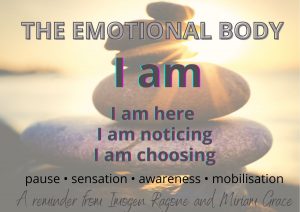
WEEK 3: June 21st 2021
Traumatisation: The body during a pandemic
“I am choosing.”
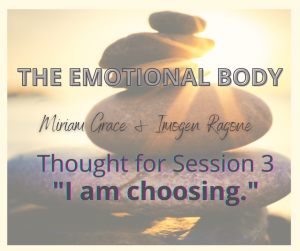
We start by establishing inner “islands of safety” within the body. This means helping patients identify parts of the body, postures, or movements where they can ground themselves whenever they feel stuck, terrified, or enraged. These parts usually lie outside the reach of the vagus nerve, which carries the messages of panic to the chest, abdomen, and throat, and they can serve as allies in integrating the trauma. I might ask a patient if her hands feel okay, and if she says yes, I’ll ask her to move them, exploring their lightness and warmth and flexibility.
Bessel A. van der Kolk,
The Body Keeps the Score: Brain, Mind, and Body in the Healing of Trauma
“Between stimulus and response there is a space.
In that space is our power to choose our response.
In our response lies our growth and our freedom.”
Viktor Frankl
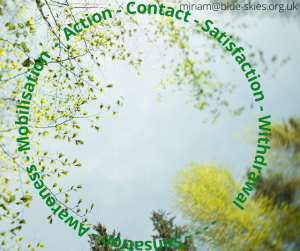 Miriam: Put aside a few minutes in a safe space to explore the concept of authentic movement. Explanation below in video format. The homework will begin with noticing and lead to authentic mobilisation in an expressive form, but the expression is for you not for an audience.
Miriam: Put aside a few minutes in a safe space to explore the concept of authentic movement. Explanation below in video format. The homework will begin with noticing and lead to authentic mobilisation in an expressive form, but the expression is for you not for an audience.
Watch this video I made for you FIRST click here –
and then this clip about authentic movement (footage about a group of breast cancer survivors who used authentic movement therapeutically post treatment). Create your own (safe) pandemic non verbal therapy session and expression. Do alone.
Choose one thing you do regularly, where you can practice bringing in the idea of pausing and “I am free to notice ease” before and/or during the activity (e.g. brushing your teeth).
Resources:
Videos:
Imogen and Miriam: “Getting Back Out There? Hope and Dread As We Emerge from the Pandemic!”
Imogen and Shay: “5 Things Anyone Can Do to Build Resilience in the Face of Pandemic Stress and Trauma”
Blogs:
Miriam: Monkey Balls: https://blue-skies.org.uk/2020/04/16/just-when-i-get-my-ducks-in-a-row-in-come-the-monkeys/
Imogen: Lessons in Uncertainty: https://bodyintelligence.me/lessons-in-uncertainty/
Podcasts:
Brené Brown talks with Priya Parker on How We Return and Why It Matters
https://brenebrown.com/podcast/brene-with-priya-parker-on-how-we-return-and-why-it-matters-part-1-of-2/
Viktor Frankl
Babette Rothschild
The Body Keeps The Score – article
Martin Buber – I thou
WEEK 2: June 14th 2021
Is Any BODY there? : Working in a virtual world
“I am here.”

Between stimulus and response there is a space. In that space is our power to choose our response. In our response lies our growth and our freedom.
Viktor Frankl
TOUCH is what we desire in one form or another, even if we find it through being alone, through the agency of silence or through the felt need to walk at a distance: the meeting with something or someone other than ourselves, the light brush of grass on the skin, the ruffling breeze, the actual touch of another’s hand; even the gentle first touch of an understanding which until now, we were formally afraid to hold.
Whether we touch only what we see or the mystery of what lies beneath the veil of what we see, we are made for unending meeting and exchange, while having to hold a coherent mind and body, physically or imaginatively, which in turn can be found and touched itself. We are something for the world to run up against and rub up against: through the trials of love, through pain, through happiness, through our simple everyday movement through the world.
EXCERPT FROM ‘TOUCH’ in CONSOLATIONS: The Solace, Nourishment and Underlying Meaning of Everyday Words. © David Whyte and Many Rivers Press
WEEK 2 ASSIGNMENTS:
Continue to practice TheCyCle twice a day – ideally in the morning and some time later in the day.
What do you notice?
Guided Exercise: Breaking Emotional Habits
Miriam developed this method of Emotional Regulation Training, from the work of Manfred Cline. In this guided exercise you can experiment and experience briefly a full range of emotions within your body, increase your tolerance and reduce your fear of your own natural processes. As with any physical exercise, a little discomfort is possible if you use muscles you’re not practised in using, but do not go in pain / distress, grade it for yourself at a tolerable level, do a bit less with each stage than you think you can manage, forget ‘trying’.
***Psychotherapists – if you use this with clients please reference Miriam Grace, thank you. Miriam does not recommend for use with a person until you’ve explored their resistance to these feelings together, it’s a much more advanced experiment than would suit a person new to psychotherapy.
Miriam always did this in session when I was on hand, and often did just 3 emotions to start as a way of gauging the usefulness.
WEEK 2 RESOURCES:
This week we would love to hear your reviews, recommendations and references.
We have put up our BOOK LIST on the members page this week and will add your suggestions and comments.
Please also refer to Week 1 podcasts / videos / articles below. We will add a few more for week 2 throughout the week so do check back at the weekend.
VIDEOS:
- Miriam and Imogen discuss: Safe Uncertainty: Is Safety Achieved in the Body or through the Mind?
- “CyCling” with Ease to Down-Regulate Stress and Trauma – In this video Imogen discusses using TheCyCle to down-regulate your nervous system from the point of view of helping with stress and trauma.
- A Video from Miriam – Coping with Uncertainty – this was designed for students but is helpful for all of us and our clients:
ARTICLES:
- What is Gestalt Psychotherapy?
Here you can find 2 page summary of Gestalt Psychotherapy. This should explain why we are combining Gestalt and Alexander. If you’ve heard of ‘body armouring’ and Reichian therapy – the ‘father’ of Gestalt, Perls, was in therapy with Reich – a body psychotherapist.
- The Memory of the Flesh: The Family Body in Somatic Psychology KATHARINE YOUNG
Family traditions take a somatic turn in a therapeutic practice that focuses on how bodies are passed down in families, not as assemblages of biological traits enjoined on the bodies of children by parents but as intentional fabrications devised by children out of the bodies of parents. Somatic psychology holds that parents offer children models of how to be embodied in the form of corporeal dispositions. Taking up the techniques by which a person makes her body, the somaticist induces her to unmake and remake it. - Coping with Uncertainty – a blog by Miriam.
How does Gestalt fit with Alexander? – Alison Taylor
Our group member, Alison, has been evolving her own thinking around the marrying of these concepts. This is a work in progress of her but we hope she will generous enough to continue sharing her thinking with us.
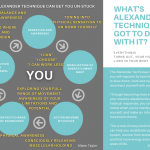
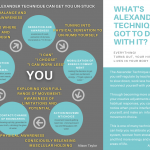
PODCASTS:
- What the pandemic is doing to our brains – a Podcast (and article) about what is happening in our nervous system. (OnBeing with Krista Tippett in conversation with Christine Runyan, a clinical psychologist and professor in the Department of Family Medicine and Community Health at the University of Massachusetts Medical School.
-
Brené Brown in Conversation with Emily and Amelia Nagoski on Burnout and How to Complete the Stress Cycle – a Podcast about burnout! We’re all experiencing it and we’re all desperate for a way through it. In this episode, Brené Brown talks to Drs. Emily and Amelia Nagoski about what causes burnout, what it does to our bodies, and how we can move through the emotional exhaustion.
WEEK 1: June 7th 2021

The Wise Body: Self Awareness and Self Care
“I am noticing.”
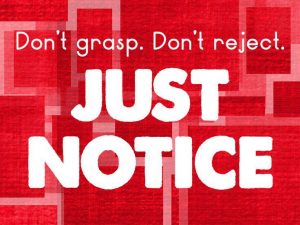
Physical self-awareness is the first step in releasing the tyranny of the past.
Bessel A. van der Kolk
Awareness in and of itself is curative.
Fritz Perls
As a single footstep will not make a path on the earth, so a single thought will not make a pathway in the mind. To make a deep physical path, we walk again and again. To make a deep mental path, we must think over and over the kind of thoughts we wish to dominate our lives.
Wilferd Arlan Peterson, The Art of Living, Day by Day
WEEK 1 ASSIGNMENT:
Practice TheCyCle twice a day – ideally in the morning and some time later in the day. There’s a guided video below if you would find this helpful to get you started, and a handout has been emailed to you.
What do you notice?
Also listen to at least one video or podcast – they range from 2 minutes to over an hour long so you should be able to find one to fit your life. Each one is so valuable we hope you’ll be tempted to listen to more.
And finally for those of you that want to, why not put the words “I am noticing” on your desk, laptop, notepad, fridge door this week?
VIDEOS:
- THE EMOTIONAL BODY (16 minutes)
Miriam and Imogen discuss (chat number 1: The Gestalt Cycle and the Alexander Technique) - TheCyCle (3 minutes)
To be used for daily practise: Imogen guiding. -
The Gestalt Cycle video – Miriam was recorded yesterday during our session. Private link (need to know link to view) on Vimeo.
- Psychotherapy needs an Embodied Approach (2 minutes each)
2 Nick Totton 1:44 – Why we often prefer the mind to the body!
- Alexander Technique can incorporate a psychotherapeutic understanding (34 minutes – can listen as podcast rather than watch) Imogen’s discussion with trauma awareness activist, Shay Seaborne.
- Other synthesis of Gestalt and Alexander (8 minutes)
The Reubenfeld Synergy Method developed by Ilana Reubenfeld (a Gestaltist who gained so many ‘ah-has’ from Alexander Technique she combined them into one therapy combining touch and talking). Here is a 8 minute demonstration by Reubenfeld: Some testimonials show how working with the body in this method by-passes the overthinking and intellectualisation. Reubenfeld is not our approach but a thought provoking example of losing the words.
- Some Neuroscience (14-minute TED talk)
Why do we hurt? Do we actually experience pain, or is it merely an illusion?
Lorimer Moseley explores these questions, looks at what this might mean for those who suffer from chronic pain.
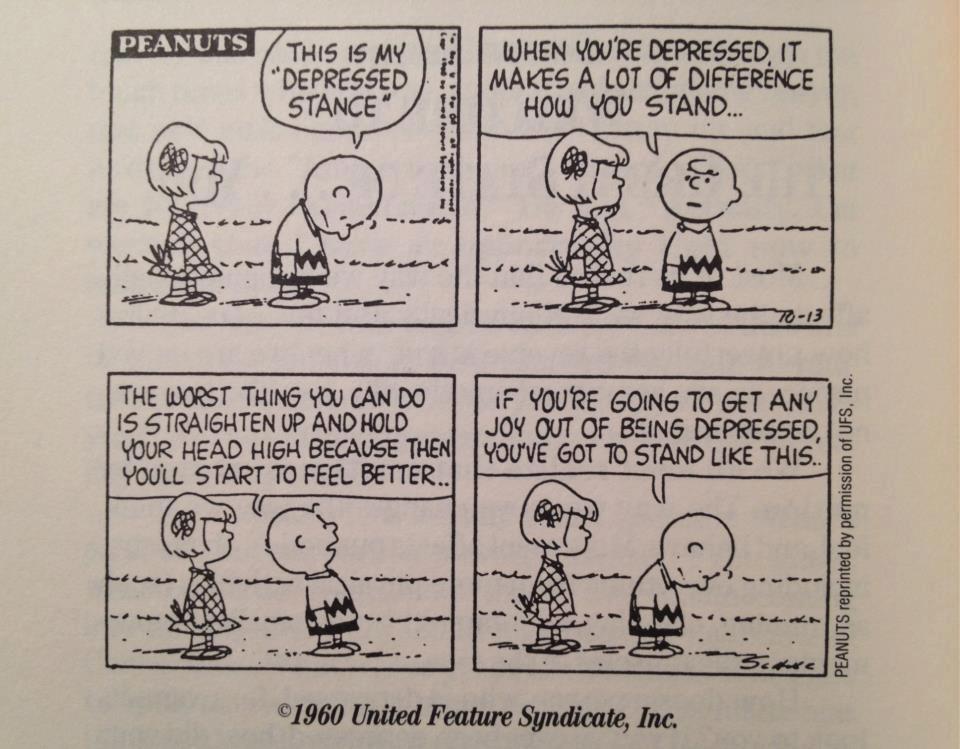
PODCASTS:
- Emotions: Brene Brown & Marc Brackett (53 minutes)
Dr. Marc Brackett has dedicated his life to studying emotions and to teaching us what he’s learning. In this episode, Brene Brown talks with Marc about how emotional literacy – being able to recognize, name, and understand our feelings – affects everything from learning, decision making, and creativity, to relationships, health, and performance.
BLOGS by Miriam & Imogen:
Psychotherapy Without Words https://blue-skies.org.uk/2021/06/04/psychotherapy-without-words-2/
Pause Gently: Hold Lightly https://blue-skies.org.uk/2021/06/06/pause-gently-hold-lightly-2/
I thought inhibition was ‘bad’?: Therapeutic restraint as a path to the self https://blue-skies.org.uk/2021/05/15/i-thought-inhibition-was-bad-therapeutic-restraint-as-a-path-to-the-self/
Here and Now: the timeless, powerful and effective Gestalt teaching https://blue-skies.org.uk/2021/05/08/here-and-now-the-timeless-powerful-and-effective-gestalt-teaching/
Freedom to Change: https://bodyintelligence.me/freedom-to-change/
REFRAIN YOURSELF by Pema Chodron
“It’s painful when you see how in spite of everything you continue in your neurosis; sometimes it has to wear itself out like an old shoe. However, refraining is very helpful as long as you don’t impose too authoritarian a voice on yourself. Refraining is not a New Year’s resolution, not a setup where you plan your next failure by saying, “I see what I do and I will never do it again,” and then you feel pretty bad when you do it again within the half hour.
Refraining comes about spontaneously when you see how your neurotic action works. You may say to yourself, “It would still feel good; it still looks like it would be fun,” but you refrain because you already know the chain reaction of misery that it sets off.”
From her book, Start Where You Are
![]()
P – A – U – S – E
Welcome to our 2021 cohort!
Preparing for your Continuing Professional Development (CPD) experience
ZOOM Link for our Workshop Sessions:
https://zoom.us/j/94196414894?pwd=d0V0VytmRGFNR29QR0NzT2FqM1VaUT09
Meeting ID: 941 9641 4894
Passcode: mindbody
This link can also be found on your acuity scheduling receipt and weekly reminders. It will be the same link for all sessions.
Zoom sessions are Mondays from 11am – 12:30pm US Eastern Time / 4 – 5.30pm UK (Click here to find your time zone)
Preparing for your Online Session
Welcome to our 4th Body Mind Workshop: The Emotional Body.
If you’ve worked with us in a face to face situation before or are new to working online, take time to check through the information below will help you to make the most of your CPD.
Technical Readiness:
Technical problems may be part of the process. To minimise such issues please check that your WiFi connection is good, that your device is charged and that you also have a phone for backup and charger for your device and phone.
If things go wrong or you can’t connect, check your email or texts. Please don’t worry, it’s a completely normal part of online training. It’s the equivalent to a queue for the loo or the door code not working at a venue. We can minimise these problems in advance and practise a relaxed responsiveness when things go wrong in the moment.
If at all possible, use a computer or tablet for the online sessions on Zoom, as the larger screen will enable you to view the other participants more easily.
Physical and Psychological Readiness:
A difference with online workshops is that we cannot set up the space to indicate support and privacy for you in the same way we could in a physical space. This means, that some of this is your job. Ensure that your workshop space is private and you will not be overheard, that you have a comfortable seat, if possible space to move and/or lie down if you are able, and that a drink, tissues, and so forth are available.
This is not school – let yourself move around, adjust your position, make yourself comfortable. Notice if you feel glued to the screen or to your chair and challenge yourself to look away or to fidget constructively.
Self responsibility for physical wellbeing is part of the work and we also hope you will ask us directly to meet your learning needs. We have a wealth of experience, materials and a passion to share. We can adjust session to group interests. Please give feedback throughout and let us know if we can help with your access needs.
Your Trainers, and how to contact us:
 Miriam Grace
Miriam Grace
Email: miriam@blue-skies.org.uk
Website: blue-skies.org.uk
Facebook Page: Miriam Blue Skies
Facebook Group: Skies are Blue: A Thousand Beautiful Things
I have been a psychotherapist for 30 years and you can see my qualifications and experience on my website. My training in Gestalt introduced me to body psychotherapy and I’ve since undertaken further training in somatics, movement and body work therapy.
I am currently working from the UK via video link and exploring body based interaction and relating via this new medium. In terms of online work I have tutored on several counselling courses for UDOL (University of Derby Online), I have run online coaching groups and negotiated and used online video calls for my face to face clients, when they were unable to attend in person, over several years. The transition to 100% remote working, due to the Coronavirus situation, was a change in my practice and I attended workshops, webinars and supervision in 2020 to ensure that my practice is informed and professional.
 Imogen Ragone
Imogen Ragone
Email: imogen@imogenragone.com
Website: imogenragone.com
Facebook Page: BodyIntelligence with Imogen Ragone
Facebook Group: BodyIntelligence Community – please join!
I have been a certified teacher of the Alexander Technique for 15 years, and have developed my own approach, BodyIntelligence, which emphasizes an embodied mindfulness that can be applied to all sorts of activities and situations – life, in fact! I have been successfully working with clients online, both individually and in groups, since 2014, and enjoy how empowering for my clients this medium can be.
I am from Sheffield, in the UK, but have lived in the US since 1991!
Awareness of self and Others / Group Boundaries
RESPECT FOR SELF:
• Allow time for this learning.
• Make a safe space as above.
• You’re paying for qualified professionals to support you, so please be honest with feedback as you go along.
RESPECT FOR OTHERS:
• Please arrive in the waiting room a few minutes before the meeting so as not to interrupt. Please leave your camera on and prevent others in your household from overhearing.
• Never discuss anyone else’s personal material outside the group.
• It is more likely that interrupting and speaking over others will happen on Zoom than face to face. Forgive yourself and each other while we all try to minimise this but also feel free to use the raised hand icon (or literally raise your hand!) if you feel the need to speak.
• Please maintain respect for difference, this may include being aware of unconscious bias around race, disability, sexuality or gender.
• You can participate in reviewing these guidelines as we go along.
RESPECT FOR YOUR TRAINERS:
• If you have questions or concerns please let us know as soon as possible.
Structure
Four 90-minute online sessions using Zoom video conferencing.
Outline: Meditations, experiential exercises, group discussion and short break half way through
Content:
Session 1 – The Wise Body: Self care and body awareness
Session 2 – Is Any BODY there?: Working in a virtual world
Follow up: Resources and handouts will be sent via email.
Week 1 Resources: These will be posted here two days after each session, so you will have everything in one place.
